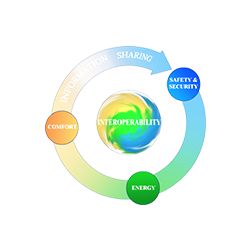Adaptive Manufacturing
The future in the energy system is called Smart Grid. The interest in such an innovation in the actual energy scenario is due to many reasons: global warming, peak in oil prices, etc. However the transition to a new distribution net yields to changes also at domestic systems. Accordingly, dedicated controllers are necessary in the view of coordinating and control domestic loads according to prices and status of the distribution net.
This project includes the consumer’s needs in the control problem: the user’s comfort is an important variable to include in the control problem. SHELL thinks that environment will be not domestic if user’s comfort is not the priority.
User is absolutely the main actor: he has the freedom to choice according with its needs. Resources and home environments follow the needs of users. They foster energetic efficiency according to different performance criteria and promote the interaction with exterior.
PROJECT DESCRIPTION WP2: Energy efficiency manager
This work package’s goal is to develop control techniques aimed to optimize the performances of energy systems. These control algorithms act like energy managers because they provide optimal solutions in the view of minimizing production costs and maximizing energy efficiency.
The partners involved are leaders in their own business areas. Moreover, universities and industries cooperate in the view of developing software/hardware solutions which are marketable and easy to install.
The need for the energy efficiency manager arises from the combination of RESs (Renewable Energy Sources), storage systems and loads: all these units must be coordinated and controlled in order to optimized energy efficiency. SHELL focuses on domestic scenario, however this WP includes also an industrial one as a micro-grid.
The WP2 addresses the following areas of interests:
- energy consumption and demand including lighting and thermal systems,
- control and optimization algorithms applied to storage systems,
- tailored communication protocols, modules for data acquisition and analysis, systems for fault detection and diagnosis integrated in the developed frameworks.
In the traditional home automation, each service has a proper framework, with an exclusive use and several services are independent, they do not “speak” or interact between them. This carries to expensive duplications, difficulties in the coordination of functionalities, hidden exercise costs and to a reduced efficiency of home automation, in terms of security, comfort and economy. Therefore, a unique framework for services integration and communication is very important to avoid that kind of problems. The interoperability framework guarantees a high comfort level of living spaces; it ensures protection and safety against damaging events for health of structures and users; it contains energetic consumption.
SHELL, and in particular Objective to Realize 4 (OR4), proposes and develops a safety and security manager. This will be able to manage and integrate in a unique framework all security and safety aspects. This manager consents the supervision of technical alarms; in this way there is an optimization of ordinary and extraordinary maintenance and a reduction of wasting time. In case of risk, the tele management of technical alarms will activate all the procedures linked to the intervention of a single event; these procedures will be active in the system until the solution of the problem. Single alarms will be automatically transferred to different subjects, according to table’s priority: Final User; Service Centre; Security Society; Society for the Maintenance, etc. The safety and security manager will be developed through algorithms and models for the management of preventive maintenance and the breakdown diagnostic presented in the scientific literature. In this way, there is more protection of safety and security of people.
Monitoring system layout of Leaflab in Loccioni
Leaf House in Loccioni
Monitoring system layout





